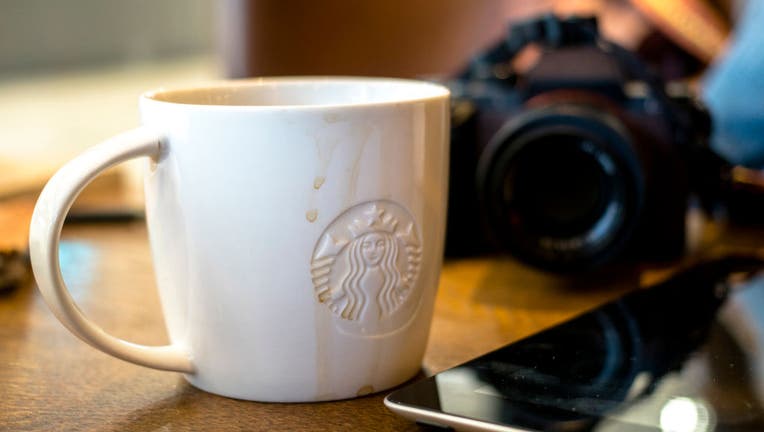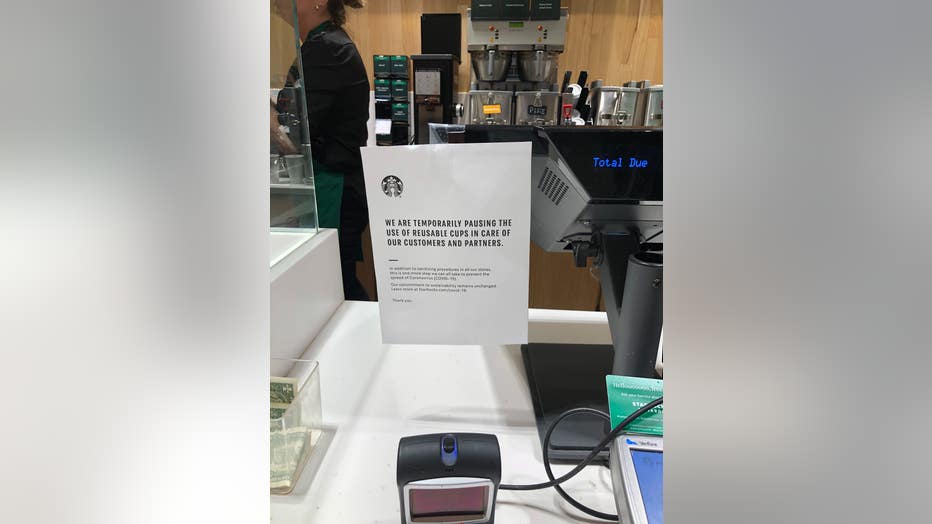Leave your mug at home: Starbucks bans personal cups amid coronavirus outbreak

FILE - A coffee mug sits on a table while a customer takes a break in a Starbucks shop. (Photo by Zhang Peng/LightRocket via Getty Images)
LOS ANGELES - As businesses struggle to adapt and respond to the global outbreak of the novel coronavirus, Starbucks instituted a change to its policy on personal cups.
The coffee chain typically allows customers to bring their own mug or cup for coffee in exchange for a 10-cent discount on their purchase.
But with COVID-19 continuing its spread within countries worldwide, including the United States, Starbucks said it is "pausing" personal cup use in its locations, though it said the discount will still be available for those who ask for it.
MAP: This is where there are confirmed coronavirus cases in the US and around the world

A sign at a Starbucks in Chicago on March 5, 2020 explains the company's "pause" on use of personal cups by customers amid the COVID-19 outbreak. (Adam Zielinski, FOX 32 Chicago)
"We are pausing the use of personal cups and 'for here' ware in our stores. We will continue to honor the 10-cent discount for anyone who brings in a personal cup or asks for 'for here' ware," the company announced in a blog post.
Starbucks announced that its stores have also upped their level of cleaning and sanitizing in an effort to prevent the spread of germs, in accordance with CDC guidance.
RELATED: Lysol, Clorox likely effective in killing COVID-19, EPA suggests, but testing hasn’t yet been done
Starbucks' decision could prove an important measure in limiting the spread of the virus. According to recent studies, the novel coronavirus strain responsible for the recent deadly global outbreak is more contagious than SARS and MERS, and can potentially live on surfaces for up to nine days.
COVID-19 is known to spread mainly from person-to-person contact through sneezing and coughing, but a separate study published in The Journal of Hospital Infection found that the virus may be able to live on surfaces like metal, glass or plastic for up to nine days.
Increased temperatures of 30 or 40 degrees Celsius were found to reduce the duration of how long the virus persisted. Household cleaning products such as bleach were found to be effective at killing the virus on surfaces within a minute, according to the study.
RELATED: COVID-19 more contagious than SARS or MERS, can live on surfaces for up to 9 days, studies say
U.S. health officials have recommended disinfecting frequently touched surfaces with household-cleaning sprays and wipes to help stop the virus’ spread. But cleaning products must be used specifically as directed to work. For example, Clorox said when disinfecting wipes are used, a surface must stay wet for four minutes, while spray cleaner with bleach needs to stand for at least 30 seconds.
“It may be possible that a person can get COVID-19 by touching a surface or object that has the virus on it and then touching their own mouth, nose, or possibly their eyes, but this is not thought to be the main way the virus spreads,” the CDC said.
RELATED: Contaminated cash may spread coronavirus, World Health Organization warns
But the World Health Organization cautioned consumers in areas affected by the novel coronavirus to refrain from using cash, since it is possible that the virus could be transmitted when cash passes from hand to hand.

